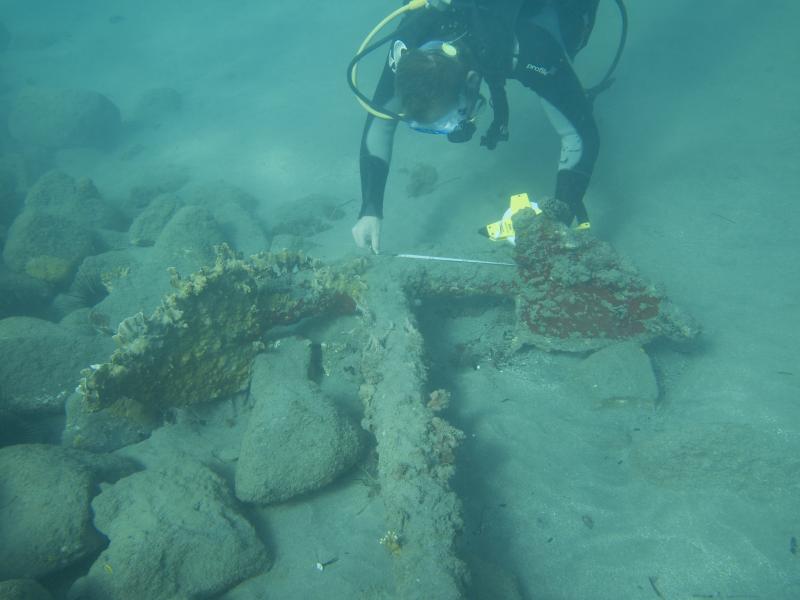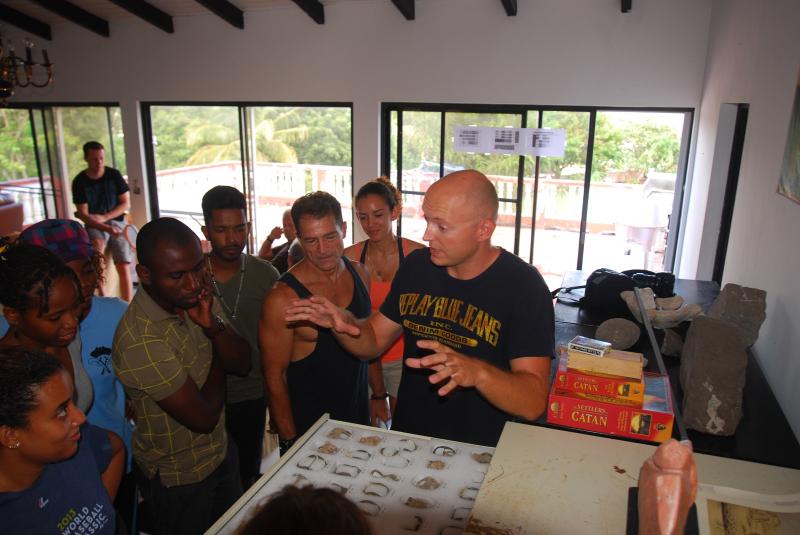Anthropological Research Council
Nonprofit 501(c)(3) All-Volunteer Staff
3379 Westphal Drive
Johns Island, SC 29455
ph: 703-966-3219
fax: 843-501-7752 (call ahead to preset fax)
contact
- Home

- Hold History in Your Hand
- About the ARC
- ARC Projects and Programs
- Cultural Continuity in the Turks and Caicos Islands
- Gullah - Geechee Stories and Songs - Cultural Preservation through Oral History
- IN PROGRESS .............. Geo-Archaeology in the Caribbean
- COMPLETED Zooarchaeology Cotton Cay
- COMPLETED -- Maya Piedras Negras Research
- Global Research Fund
- Research Proposal Submissions
- Contact Us
- ARC Research Information Exchange
Endymion Wreck Survey
&
Turks & Caicos Islands
Salt and Cotton Production
AD 1300 – 1900
Joost Morsink, Ph.D., and Ruud Stelten, MA
Morsink C.V.-LINK Stelten C.V.- LINK
This research mapped the wreck of the Endymion, an 18th Century British Man o War, in association with examination of the role of martime trade in salt and cotton through time in Turks & Caicos Islands
Interpreting Past Environments
and Tracing
Cultural Continuity Through Time
Shipwreck Archaeology
Bermuda Sloop Research Focus

CONTRIBUTIONS
We welcome your contributions to support this important research
You may provide a contribution
via
PayPal below
or
CHECK
to
Anthropological Research Council
3379 Westphal Drive
Johns Island, SC 29455
Project Supporter
- $
- In stock
Benefactor
- $
- In stock
Partner
- $
- In stock
Full Sponsor
- $
- In stock
This research examines cultural continuity from precolonial through colonial times in the Turks & Caicos Islands by identifying the role of salt and cotton productions in local economies.
The distinction between precolonial and colonial times, associated with the arrival of colonists from Europe, the subsequent decimation of native groups, the introduction of African slaves, and import of non-native products, animals, and plants, is often envisioned as a strong breach of cultural continuity.
However, on the Turks & Caicos Islands, salt and cotton production were important natural resources that were exploited and exchanged before and after Europeans arrived in this archipelago. In addition, the rapid collapse of local native groups has been recently questioned through new evidence of native groups occupying the island until the early 17th century (Morsink 2015).
Through a multi-disciplinary approach, this research focuses on pollen analysis to determine the role of cotton production throughout time, documents colonial structures on Salt Cay involved in salt and on Cotton Cay for cotton production, and investigates a ship wreck, a possible Bermudian sloop, to further our understanding of the maritime landscape and exchange of salt and cotton on a global scale.
Intellectual Merit
This research is particularly significant for our understanding in five academic topics.
- First, this research will explore how cultural continuity and disruption are defined by economic practices in the local, small-scale context of the Turks & Caicos Islands.
- Second, this research builds on recent discoveries of cultural continuity of native groups in these islands beyond the previously accepted mark of AD 1513, when natives were thought to have been absent in this archipelago (Morsink 2015).
--Third, pollen analysis will investigate the role and continuity of cotton production in the region for precolonial and colonial periods.
--Fourth, this research will document existing historical structures on Salt Cay and Cotton Cay, providing a baseline for understanding the terrestrial component of colonial salt and cotton production.
--Finally, examining a ship wreck will contribute to the maritime component of salt and cotton exchange and illuminate how the local production of these resources affected a globalizing economy. This research also has the potential to be the first to identify the remains of a Bermudian sloop, the fastest ship on the world seas at its time, providing a new and unique opportunity to study the technology and use of this ship. re
This research aims to answer the following questions:
1. How was cultural continuity affected by the introduction of new people, diseases, products, and customs in the Turks & Caicos archipelago?
2. How did the salt and cotton production operation on Salt Cay and Cotton Cay function throughout the colonial period, and what were the experiences of the people living and working here?
3. How does the maritime cultural landscape of the Turks Islands compare to that of other salt production sites in the Caribbean region?
In which ways can shipwrecks add to our knowledge of the role the Turks Islands played in the Caribbean and Atlantic World trade networks?
Re
---
Copyright 2016 Anthropological Research Council - ARC. All rights reserved.
3379 Westphal Drive
Johns Island, SC 29455
ph: 703-966-3219
fax: 843-501-7752 (call ahead to preset fax)
contact

